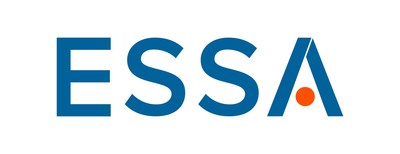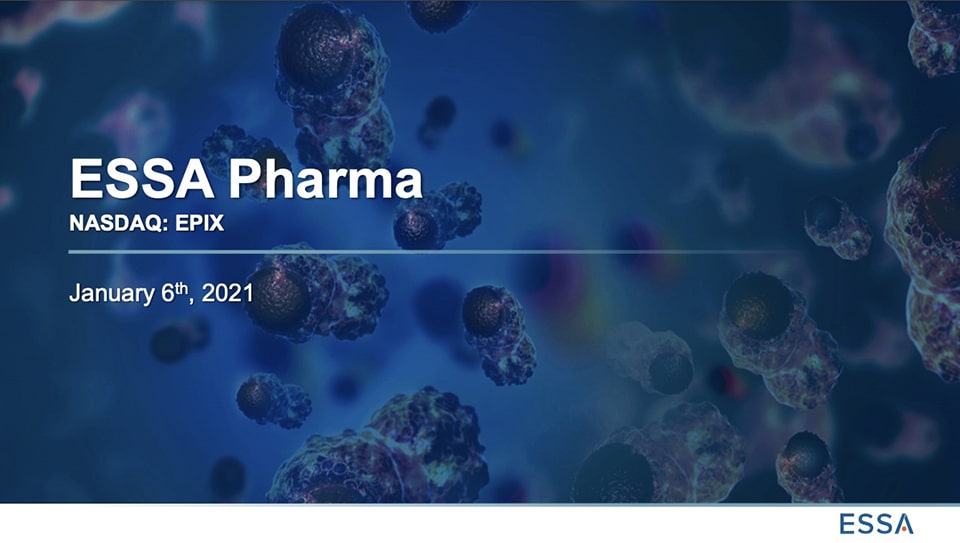

- Updated data from ongoing Phase 1 trial presented at ESMO
- Confirmed EPI-506 is well-tolerated with a favorable safety profile
- Long-term stable disease and PSA reductions at higher dose levels in some patients indicate signs of efficacy and suggest the need for a more potent agent
- Clinical activity supports inhibition of N-terminal domain of androgen receptor
- Company makes strategic decision to prioritize next-generation Aniten program for mCRPC over further clinical development of EPI-506
- ESSA initiates corporate restructuring to refocus R&D efforts
- Company to present today at Rodman and Renshaw 19th Annual Global Investment Conference
HOUSTON and VANCOUVER, Sept. 11, 2017 /CNW/ - ESSA Pharma Inc. (TSX: EPI; NASDAQ: EPIX) ("ESSA" or the "Company"), a clinical-stage pharmaceutical company focused on the development of novel small molecule drugs for the treatment of prostate cancer, today announced that results from the Phase 1 portion of the Phase 1/2 clinical trial of EPI-506 for the treatment of metastatic castration-resistant prostate cancer ("mCRPC") were presented at the European Society for Medical Oncology ("ESMO") held in Madrid, Spain. EPI-506 (ralaniten acetate) is a first generation N-terminal domain inhibitor of the androgen receptor (AR-NTD).

The open-label, single-arm, dose-escalation study evaluated the safety, pharmacokinetics, maximum tolerated dose, and anti-tumor activity of EPI-506 in men with end-stage mCRPC who have progressed after prior enzalutamide and/or abiraterone treatment and may have received one prior line of chemotherapy. Twenty-eight patients were available for analysis and each patient had received four or more prior therapies for prostate cancer at the time of study entry. Patients self-administered oral doses of EPI-506 ranging from 80 mg to 3600 mg, with mean drug exposure of 85 days (range of eight to 535 days). Four patients have undergone prolonged treatment (median of 318 days; range 219 to 535 at data cut-off), following intrapatient dose escalation. Prostate-specific antigen ("PSA") declines ranging from 4% to 29% were observed in five patients, which occurred predominantly in the higher dose cohorts (≥1280 mg).
EPI-506 was generally well-tolerated with a favorable safety profile across all doses up to 2400 mg. At a dose of 3600 mg, gastrointestinal adverse events (nausea, vomiting, abdominal pain) were observed in two patients: one patient in the once-daily ("QD") dosing cohort and one patient in the 1800 mg twice-daily dosing cohort, leading to study discontinuation and dose-limiting toxicity ("DLT") due to >25% missed doses in the 28-day safety reporting period. A separate patient in the 3600 mg QD cohort experienced a transient Grade 3 increase in liver enzymes (AST/ALT), which also constitutes a DLT, so enrollment was concluded in that cohort.
"Signs of efficacy at higher-dose levels in this open-label Phase 1 clinical trial, combined with the overall safety profile, indicate that our unique approach of inhibiting the Androgen Receptor N-terminal domain may provide a clinical benefit to mCRPC patients," said Frank Perabo, M.D., Ph.D. and Chief Medical Officer at ESSA.
While the clinical profile of EPI-506 or its active metabolite, EPI-002, could potentially be enhanced through reformulation efforts, ESSA believes that prioritizing development of one of its next-generation NTD inhibitors ("Aniten") with greater potency and other enhanced pharmaceutical properties offers the most compelling regulatory and commercial pathway. As a result, ESSA will discontinue further clinical development of EPI-506 and will implement a corporate restructuring plan to focus R&D resources on its next-generation Anitens targeting the AR-NTD.
"We were encouraged by the data from the Phase 1 portion of the Phase 1/2 clinical trial and are pleased to have established the safety and clinical utility of targeting the N-terminal domain ("NTD") in refractory mCRPC patients," said David Parkinson, M.D., President and Chief Executive Officer of ESSA. "Our next-generation Aniten program is structurally similar to EPI-506 and has the potential to deliver increased potency and an improved pharmacological profile, so it represents a more favorable value proposition for ESSA. We look forward to shifting our focus to advance the Company's promising Aniten program."
ESSA's next-generation Aniten compounds represent a new class of drugs that are NTD inhibitors of the androgen receptor ("AR") and are designed to improve upon a number of attributes of first-generation compound, EPI-506. The next-generation Anitens are considerably more potent than EPI-506 or its active metabolite, EPI-002, in an in vitro assay measuring inhibition of AR transcriptional activity. In addition, the compounds are designed to improve upon the pharmaceutical properties of EPI-506 to enable a more efficient and cost-effective formulation approach. The Aniten program is currently at the Investigational New Drug ("IND") lead-selection stage with an IND filing expected to occur in early 2019.
The corporate restructuring associated with ESSA's updated clinical plan is expected to lower cash expenditures in fiscal 2018 by approximately US$7 million relative to fiscal 2017, resulting primarily from the discontinuation of EPI-506 clinical costs. As previously reported, the Company ended June 30, 2017 with $7.2 million in cash, cash equivalents and short-term investments, and anticipates that its current resources are sufficient to support planned operations into the fourth calendar quarter of 2017.
"I would like to personally express my appreciation to each of the employees impacted by this decision for their commitment to ESSA and the EPI-506 program as well as the patients and clinical investigators who helped define the properties of this new class of drug," continued Dr. Parkinson. "The results of their efforts will drive further development in this important area of clinical need as we reallocate our resources to the Aniten program."
ESSA wishes to remind investors that Dr. Parkinson will be presenting at the Rodman & Renshaw 19th Annual Global Investment Conference in New York City today at 4:15 PM Eastern Standard Time, at the Lotte New York Palace Hotel. To access the live webcast, please visit www.wsw.com/webcast/rrshq27/epi/.
About ESSA Pharma Inc.
ESSA is a clinical-stage pharmaceutical company focused on developing novel and proprietary therapies for the treatment of CRPC in patients whose disease is progressing despite treatment with current therapies. ESSA believes that its proprietary compounds can significantly expand the interval of time in which patients suffering from CRPC can benefit from hormone-based therapies, by disrupting the AR signaling pathway that drives prostate cancer growth and by preventing AR transcriptional activity by binding selectively to the NTD of the AR. A functional NTD is essential for transactivation of the AR. In preclinical studies, blocking the NTD has demonstrated the capability to overcome the known AR-dependent mechanisms of CRPC. ESSA was founded in 2009.
About Prostate Cancer
Prostate cancer is the second-most commonly diagnosed cancer among men and the fifth most common cause of male cancer death worldwide (Globocan, 2012). Adenocarcinoma of the prostate is dependent on androgen for tumor progression and depleting or blocking androgen action has been a mainstay of hormonal treatment for over six decades. Although tumors are often initially sensitive to medical or surgical therapies that decrease levels of testosterone, disease progression despite castrate levels of testosterone generally represents a transition to the lethal variant of the disease, mCRPC, and most patients ultimately succumb to the illness. The treatment of mCRPC patients has evolved rapidly over the past five years. Despite these advances, additional treatment options are needed to improve clinical outcomes in patients, particularly those who fail existing treatments including abiraterone or enzalutamide, or those who have contraindications to receive those drugs. Over time, patients with mCRPC generally experience continued disease progression, worsening pain, leading to substantial morbidity and limited survival rates. In both in vitro and in vivo animal studies, ESSA's novel approach to blocking the androgen pathway has been shown to be effective in blocking tumor growth when current therapies are no longer effective.
Forward-Looking Statement Disclaimer
This release contains certain information which, as presented, constitutes "forward-looking information" within the meaning of the Private Securities Litigation Reform Act of 1995 and/or applicable Canadian securities laws. Forward-looking information involves statements that relate to future events and often addresses expected future business and financial performance, containing words such as "anticipate", "believe", "plan", "estimate", "expect", and "intend", "potential", "promising", "refocus" statements that an action or event "may", "might", "could", "should", or "will" be taken or occur, or other similar expressions and includes, but is not limited to, statements about the Company's Phase 1 clinical trial of EPI-506, expectations regarding the acceleration of ESSA's next-generation NTD-inhibitor Aniten compounds, the anticipated timing of the IND filing for the Aniten program, anticipated future efficiencies and cost savings associated with ESSA's corporate restructuring, the anticipated sufficiency of the Company's financial resources, and the implementation of the Company's business model and strategic plans including the advancement of the Company's development portfolio.
Forward-looking statements and information are subject to various known and unknown risks and uncertainties, many of which are beyond the ability of ESSA to control or predict, and which may cause ESSA's actual results, performance or achievements to be materially different from those expressed or implied thereby. Such statements reflect ESSA's current views with respect to future events, are subject to risks and uncertainties and are necessarily based upon a number of estimates and assumptions that, while considered reasonable by ESSA as of the date of such statements, are inherently subject to significant medical, scientific, business, economic, competitive, political and social uncertainties and contingencies. In making forward looking statements, ESSA may make various material assumptions, including but not limited to (i) the accuracy of ESSA's financial projections; (ii) the Phase 1 portion of the Phase 1/2 clinical trial proceeding as expected; (iii) obtaining positive results of clinical trials; (iv) obtaining necessary regulatory approvals; and (v) general business, market and economic conditions.
Forward-looking information is developed based on assumptions about such risks, uncertainties and other factors set out herein and in ESSA's Annual Report on Form 20-F dated December 14, 2016 under the heading "Risk Factors", a copy of which is available on ESSA's profile at the SEDAR website at www.sedar.com, ESSA's profile on EDGAR at www.sec.gov, and as otherwise disclosed from time to time on ESSA's SEDAR profile. Forward-looking statements are made based on management's beliefs, estimates and opinions on the date that statements are made and ESSA undertakes no obligation to update forward-looking statements if these beliefs, estimates and opinions or other circumstances should change, except as may be required by applicable Canadian and United States securities laws. Readers are cautioned against attributing undue certainty to forward-looking statements.
SOURCE ESSA Pharma Inc

